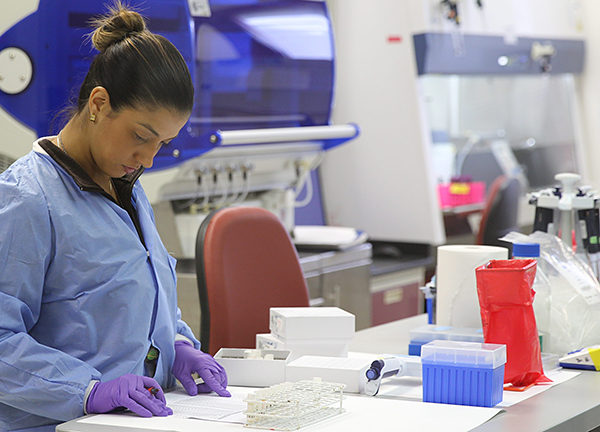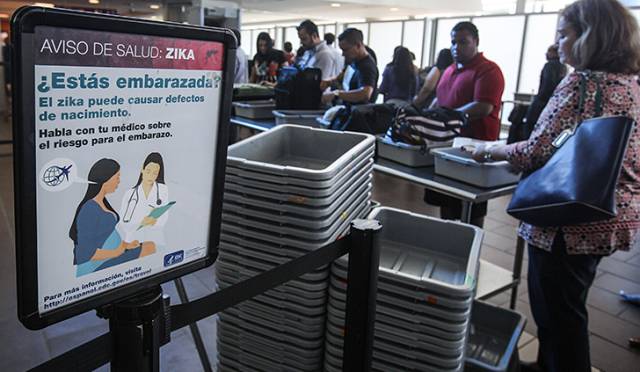You are here
One year later: Zika reflections and a look ahead
On January 22, 2016, the Centers for Disease Control and Prevention (CDC) activated its Emergency Operations Center to fight Zika, which is one of the most complex outbreak responses in the agency’s history. The World Health Organization ended Zika’s designation as a public health emergency of international concern in November 2016, announcing that Zika will require a longer-term approach to fight the virus. For CDC, which has assigned numerous disease detectives, mosquito control researchers and birth defects experts constantly since the outbreak began, the response shows no signs of slowing down.
“The long-term approach does not change our critical need to respond to Zika, or make Zika any less urgent or tragic,” said Denise Jamieson, M.D., Incident Manager for CDC’s Zika response. CDC’s Emergency Operations Center continues to operate at a level 1 activation—the agency’s highest
To date, Zika has spread to more than 60 countries and territories, and scientists are racing to develop a vaccine. More than 5,000 cases of Zika have been reported in the U.S. States and District of Columbia as of February 8, 2017, and nearly 1,400 cases have been reported among pregnant women as of January 24, 2017. Local mosquito-borne transmission of Zika has been reported in Florida and Texas. In the territories of Puerto Rico and the U.S. Virgin Islands, the outbreak continues to spread.
CDC experts have been leading a number of high priority response efforts. Among these are tracking the spread of Zika virus; teaching front-line doctors and nurses how to identify Zika; studying links between Zika and birth defects, such as microcephaly; training public health and healthcare professionals to report cases; providing guidance on preventing transmission; and advising travelers and educating the public about Zika.
“As mosquito season has ended in most of the continental United States, we are already planning for next season to protect the most vulnerable groups,” Jamieson said. “Because this is an evolving outbreak, we don’t know yet how many cases of Zika we’ll see this year, or how big the wave will be.”
Moving forward, CDC will continue to take an aggressive approach toward mosquito control, with a focus on controlling the Aedes aegypti mosquito, the so-called “cockroach of mosquitoes” that can spread viruses such as Zika, dengue and chikungunya. CDC is working with partners to follow up on affected infants over time, and to identify the full spectrum of birth defects and other problems associated with Zika.
“There are other harmful effects beyond microcephaly. We are learning that Zika is very complicated,” said Jamieson, who notes that many questions remain about the timing, risk and spectrum of outcomes associated with Zika virus infection during pregnancy. In addition to microcephaly and other severe fetal brain defects, Zika infection during pregnancy has been linked to eye defects, hearing loss and impaired growth in infants.

Jamieson explained that CDC’s U.S. Zika Pregnancy Registry, along with the Puerto Rico Zika Active Pregnancy Surveillance System, is a key way CDC collaborates with state, tribal, local and territorial health departments. Together, health experts are working to collect information that will help with updating recommendations for clinical care, planning for services for pregnant women and families affected by Zika, and preventing Zika infection during pregnancy.
The CDC Foundation, which activated its emergency response funds on February 10, 2016, has worked with the philanthropic and private sectors for a year to secure product donations and financial support to help advance CDC’s efforts. The Foundation is also working with the Puerto Rico Department of Health to ensure that women who wish to avoid or delay pregnancy have access to reversible, long-term contraceptives. Access to fast, flexible funding support is especially critical during an emergency response. Much of the Foundation’s work has been aimed at supporting CDC’s efforts in hard-hit U.S. territories, such as Puerto Rico and the U.S. Virgin Islands.
One year into the Zika crisis, the global fight against the virus continues. Looking ahead, in addition to providing support for current activities, the CDC Foundation is also striving to help CDC meet additional urgent needs that require philanthropic and private sector support. This focus will include helping to build capacity and strengthening diagnostic capabilities around insecticide-resistance and developing innovative approaches to advance mosquito control.
“The CDC Foundation has been tremendously helpful in allowing CDC to have much greater effect in our efforts,” said Jamieson. “CDC will need to focus on Zika for years until there is a safe and effective vaccine, and there is still so much we need to learn about the disease. It is critical that our primary focus continues to be doing everything possible to protect pregnant women and their babies.”
Unite with the CDC Foundation to stop Zika.
Learn more
Give now

